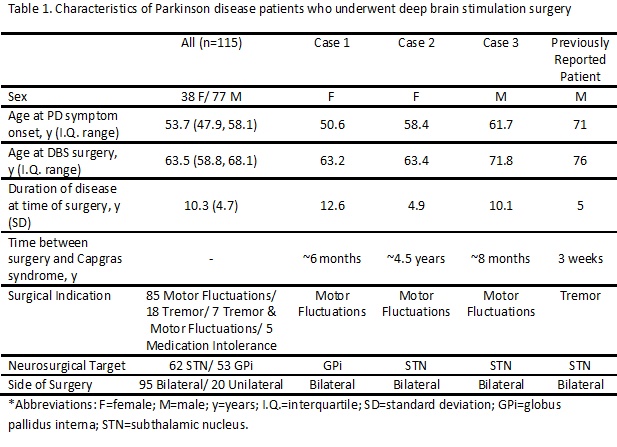Session Information
Date: Wednesday, June 7, 2017
Session Title: Parkinson's Disease: Psychiatric Manifestations
Session Time: 1:15pm-2:45pm
Location: Exhibit Hall C
Objective: The aims of this study were to investigate the frequency of Capgras syndrome in Parkinson’s disease patients who have undergone Deep Brain Stimulation (DBS) surgery and to report the characteristics of Parkinson’s disease patients with Capgras syndrome following DBS surgery.
Background: Psychosis is common in Parkinson disease, especially in advanced disease. Though visual hallucinations are the most common manifestation, other psychotic symptoms can occur, including delusions. One type of delusion that may occur is Capgras syndrome (1). In Capgras syndrome, the affected individual believes that a closely related person (or sometimes inanimate object) has been replaced by an impostor or duplicate. Capgras syndrome has been reported in a small number of Parkinson’s patients with advanced disease (1). A recent report of Capgras syndrome occurring in a Parkinson’s disease patient following DBS targeting the subthalamic nucleus raised the possibility that DBS may be involved in the development of Capgras syndrome (2).
Methods: Using a clinical database, we identified 115 Parkinson’s disease patients who underwent unilateral or bilateral DBS targeting either the subthalamic nucleus (STN) or globus pallidus interna (GPi) over a 6 year period. We performed a retrospective review of the electronic medical record to collect clinical information from the pre-surgical, surgical, and post-operative follow-up notes. To identify those with Capgras syndrome, we searched each subject’s record at least 6 months after DBS surgery using search terms specific to Capgras syndrome. When search terms were present in a subject’s record, clinical notes was reviewed to verify the diagnosis.
Results: Of the 115 PD patients in this cohort, three developed Capgras syndrome. Surgical targets in these three patients were the STN in two patients and GPI in one patient. The length of time between surgery and development of Capgras syndrome varied, and all three had evidence of worsening cognition prior to development of Capgras syndrome.
Conclusions:
Even in advanced Parkinson’s disease patients who underwent DBS, Capgras syndrome is an uncommon occurrence. Capgras syndrome is likely a manifestation of psychosis in a subset of patients and DBS may not alter its onset. Given the distressing nature of the condition, patients with advanced Parkinson’s disease who undergo DBS should be regularly screened for Capgras syndrome in addition to other more common symptoms of psychosis.
References: 1. A Moro, RP Munhoz, M Moscovich, WO Arruda, and HAG Teive. Delusional misidentification syndrome and other unusual delusions in advanced Parkinson’s disease. Park Relat Dis. 19 (2013) 751-754. 2. CR Kyrtsos, MC Stahl, P Eslinger, T Subramanian, and EB Lucassen. Capgras Syndrome in a Patient with Parkinson’s Disease after Bilateral Subthalamic Nucleus Deep Brain Stimulation: A Case Report. Case Rep Neurol. 2015;7:127-133.
To cite this abstract in AMA style:
C. Groth, A. Pusso, D. Huss, S. Sperling, B. Shah, M. Harrison, W.J. Elias, G.F. Wooten, M. Barrett. Capgras syndrome in advanced Parkinson disease [abstract]. Mov Disord. 2017; 32 (suppl 2). https://www.mdsabstracts.org/abstract/capgras-syndrome-in-advanced-parkinson-disease/. Accessed July 13, 2025.« Back to 2017 International Congress
MDS Abstracts - https://www.mdsabstracts.org/abstract/capgras-syndrome-in-advanced-parkinson-disease/

